The industrial biofuel processing machinery market is expected to grow from USD 6,510.9 million in 2025 to USD 10,111.2 million by 2035, representing substantial growth. This growth is driven by the accelerating adoption of advanced biofuel processing equipment and automated production systems across renewable energy manufacturing, agricultural waste processing, and sustainable fuel production sectors.
The first half of the decade (2025-2030) will witness the market climbing from USD 6,510.9 million to approximately USD 8,113.7 million, adding USD 1,602.8 million in value, which constitutes 45% of the total forecast growth period. This phase will be characterized by the rapid adoption of biodiesel processing equipment systems, driven by increasing renewable energy demand and manufacturing modernization programs worldwide. Advanced processing capabilities and automated handling features will become standard expectations rather than premium options.
The latter half (2030-2035) will witness sustained growth from USD 8,113.7 million to USD 10,111.2 million, representing an addition of USD 1,997.5 million or 55% of the decade's expansion. This period will be defined by mass market penetration of next-generation processing systems, integration with comprehensive biofuel manufacturing platforms, and seamless compatibility with existing production infrastructure. The market trajectory signals fundamental shifts in how renewable energy manufacturers approach biofuel processing and production handling, with participants positioned to benefit from sustained demand across multiple application segments.
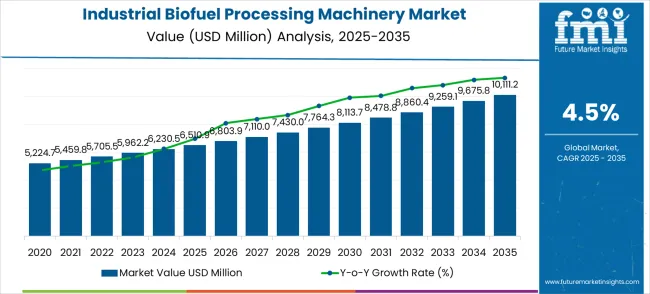
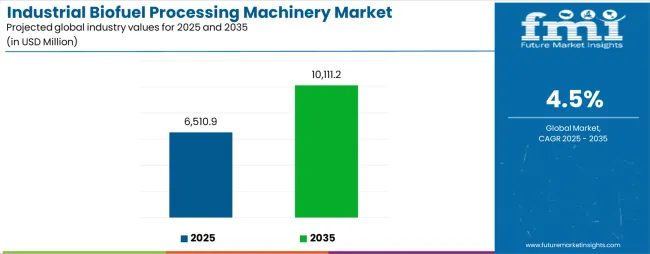
The Industrial Biofuel Processing Machinery market demonstrates distinct growth phases with varying market characteristics and competitive dynamics. Between 2025 and 2030, the market progresses through its technology adoption phase, expanding from USD 6,510.9 million to USD 8,113.7 million with steady annual increments averaging 4.5% growth. This period showcases the transition from basic manual processing systems to advanced automated platforms with enhanced efficiency capabilities and integrated process control systems becoming mainstream features.
The 2025-2030 phase adds USD 1,602.8 million to market value, representing 45% of total decade expansion. Market maturation factors include standardization of automation protocols, declining component costs for advanced processing systems, and increasing biofuel manufacturer awareness of automated processing benefits reaching 85-90% efficiency improvements in production applications. Competitive landscape evolution during this period features established renewable energy equipment manufacturers like GEA Group and ANDRITZ expanding their biofuel processing machinery portfolios, while new entrants focus on compact designs and enhanced throughput capabilities.
From 2030 to 2035, market dynamics shift toward advanced integration and multi-platform deployment, with growth accelerating from USD 8,113.7 million to USD 10,111.2 million, representing an addition of USD 1,997.5 million, or 55% of the total expansion. This phase transition centers on next-generation automated systems, integration with Industry 4.0 manufacturing networks, and deployment across diverse biofuel production scenarios, becoming standard rather than specialized applications. The competitive environment matures, with a focus shifting from basic processing capabilities to comprehensive production systems and integration with facility-wide automation and process control platforms.
| Metric | Value |
|---|---|
| Market Value (2025) → | USD 6,510.9 million |
| Market Forecast (2035) ↑ | USD 10,111.2 million |
| Growth Rate ★ | 4.5% CAGR |
| Leading Technology → | Biodiesel Processing Equipment |
| Primary Application → | Agricultural Waste to Energy |
The market demonstrates strong fundamentals with biodiesel processing equipment systems capturing a dominant share through advanced efficiency and high-throughput production capabilities. Agricultural waste to energy applications drive primary demand, supported by increasing renewable energy production and sustainable fuel manufacturing requirements. Geographic expansion remains concentrated in developed markets with established biofuel infrastructure, while emerging economies show accelerating adoption rates driven by renewable energy manufacturing growth and rising production investments.
Market expansion rests on three fundamental shifts driving adoption across renewable energy and manufacturing sectors. 1. Automation demand creates compelling operational advantages through biofuel processing machinery systems that provide precise production control with consistent repeatability, enabling manufacturers to achieve higher yields while maintaining quality standards and reducing manual handling risks. 2. Renewable energy manufacturing modernization accelerates as production facilities worldwide seek advanced automation equipment that complements existing process tools, enabling efficient batch processing and substrate handling applications that align with Industry 4.0 requirements and smart manufacturing protocols. 3. Manufacturing infrastructure enhancement drives adoption from energy companies and biofuel producers requiring effective processing solutions that maximize throughput while maintaining environmental control during advanced fuel production and packaging operations.
However, growth faces headwinds from technical complexity challenges that vary across different substrate types and processing requirements, which may limit operational flexibility in certain manufacturing environments. Cost considerations also persist regarding initial capital investment and integration expenses that may reduce system adoption rates in price-sensitive market segments that prioritize immediate cost savings over long-term automation benefits.
The industrial biofuel processing machinery market presents significant growth opportunities as global renewable energy manufacturing paradigms shift toward automated processing solutions and Industry 4.0 integration accelerates worldwide. With the market projected to expand from USD 6,510.9 million in 2025 to USD 10,111.2 million by 2035 at a 4.5% CAGR, biofuel equipment manufacturers and technology providers are positioned to capitalize on structural demand from production facilities, renewable energy manufacturers, and research institutions requiring precise processing and production capabilities.
The convergence of renewable energy manufacturing modernization programs, increasing fuel sustainability requirements, and automation emphasis on efficiency processing creates sustained market expansion opportunities. Geographic growth differentials are particularly pronounced in China (6.1% CAGR) and India (5.6% CAGR), where rapid biofuel development and manufacturing infrastructure investments drive substantial demand. Technology advancement pathways around automation, efficiency enhancement, and process integration offer differentiation opportunities, while specialized applications across biodiesel processing, bioethanol production, and biogas treatment provide diverse revenue streams.
Pathway A - Renewable Energy Manufacturing Automation & Production Modernization. Global biofuel facilities increasingly adopt automated processing machinery as standard efficiency systems for advanced production processing, packaging operations, and specialty substrate manufacturing. Production modernization programs mandate integration with existing process equipment, creating sustained procurement cycles. Companies developing facility-grade solutions with industry compatibility and environmental designs capture premium contracts. Expected revenue pool: USD 1,800-2,800 million.
Pathway B - Geographic Expansion in High-Growth Markets. China's 6.1% CAGR and India's 5.6% growth present substantial opportunities through local manufacturing partnerships, technology transfer, and domestic biofuel facility modernization. Regional expansion strategies capturing Asia-Pacific biofuel buildup and renewable energy manufacturing requirements offer volume growth and market share gains. Revenue opportunity: USD 1,500-2,400 million.
Pathway C - Technology Integration & Smart Manufacturing Systems. Integration with Industry 4.0 networks, process control systems, and automated material handling transforms basic biofuel processing machinery into comprehensive facility automation solutions. Advanced features, including efficiency optimization, environmental monitoring, and multi-platform compatibility, enable premium positioning and recurring service revenue. Expected pool: USD 1,000-1,800 million.
Primary Market Structure: The market segments by equipment type into Biodiesel Processing Equipment, Bioethanol Processing Equipment, Biogas Treatment Equipment, Integrated Biofuel Systems, and Others, representing the evolution from traditional single-purpose systems to comprehensive automated platforms for precision handling and processing efficiency.
Secondary Breakdown: Application segmentation divides the market into Agricultural Waste to Energy, Municipal Organic Waste Treatment, Industrial Organic Waste Utilization, Renewable Energy Power Plants, and Others, reflecting distinct requirements for conventional processing, specialized waste handling, and advanced substrate processing applications.
Regional Distribution: Geographic classification covers Asia Pacific, North America, Europe, Latin America, and the Middle East & Africa, with established renewable energy manufacturing regions leading adoption while emerging economies show accelerating growth patterns driven by biofuel manufacturing development programs.
Market Position: Biodiesel Processing Equipment systems command the leading position of 45% market share in the Industrial Biofuel Processing Machinery market through advanced processing features, including automated handling capabilities, computer-controlled production, and integrated process monitoring that enable biofuel manufacturers to achieve consistent processing accuracy across high-volume production operations.
Value Drivers: The segment benefits from renewable energy industry preference for automated systems that provide superior repeatability and environmental control without requiring skilled operator intervention for each processing cycle. Automated design features enable deployment in industrial environments, high-throughput manufacturing, and continuous production operations where consistency and reliability represent critical operational requirements for advanced fuel manufacturing and substrate processing applications.
Competitive Advantages: Biodiesel processing systems differentiate through intelligent control algorithms, adaptive positioning capabilities, and integration with facility-wide automation networks that enhance manufacturing efficiency while maintaining processing tolerances suitable for high-efficiency renewable energy production requirements and advanced packaging operations.
Key market characteristics:
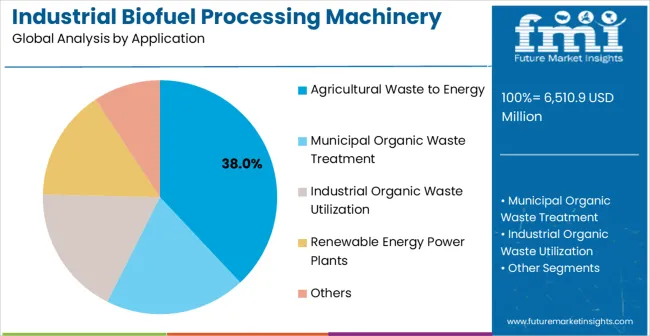
Market Context: Agricultural waste to energy applications dominate the industrial biofuel processing machinery market of 38% share due to widespread renewable energy production and increasing focus on advanced fuel manufacturing, processing operations, and substrate handling applications that require precise control for maintaining production performance and manufacturing yield optimization.
Appeal Factors: Agricultural waste processing customers prioritize processing accuracy, throughput optimization, and integration with existing renewable energy production equipment that enables coordinated processing across multiple manufacturing stages. The segment benefits from substantial biofuel industry investments and technology advancement programs that emphasize automated handling solutions for conventional agricultural waste processing in biodiesel, bioethanol, and biogas production applications.
Growth Drivers: Renewable energy industry expansion incorporates biofuel processing machinery as essential equipment for advanced production processing and packaging operations, while increasing fuel complexity and sustainability requirements drive demand for precision processing capabilities that maintain production specifications and manufacturing quality standards.
Growth Accelerators: Renewable energy manufacturing modernization drives primary adoption as biofuel processing machinery systems provide automated precision control that enables consistent production handling with high efficiency standards, supporting advanced processing and sustainable fuel manufacturing that require precise operational tolerances. Manufacturing automation demand accelerates market expansion as biofuel facilities seek efficient processing tools that minimize human intervention while maintaining environmental control and yield optimization during critical production operations and substrate preparation processes. Energy industry growth creates sustained demand for automated processing equipment that complements advanced manufacturing systems and provides operational flexibility in complex production environments where efficiency and repeatability represent critical manufacturing requirements.
Industry 4.0 integration trends further amplify adoption as manufacturers implement smart factory concepts requiring automated equipment with process monitoring capabilities, real-time data collection, and integration with manufacturing execution systems that optimize production workflow and enable predictive maintenance scheduling. Advanced processing requirements drive specialized machinery demand as biofuel manufacturers adopt new production technologies including integrated processing, system-wide solutions, and comprehensive production approaches that necessitate precise equipment control and substrate handling capabilities beyond traditional applications.
Growth Inhibitors: Capital investment barriers persist as biofuel processing machinery systems require substantial initial investment costs ranging from hundreds of thousands to millions of dollars per unit, which may limit adoption among smaller renewable energy manufacturers and research facilities operating under constrained budgets or uncertain return on investment scenarios. Technical complexity challenges create integration difficulties when incorporating new processing systems into existing facility infrastructure, particularly in older facilities where legacy equipment compatibility and process modification requirements can result in extended implementation timelines and additional engineering costs.
Market Evolution Patterns: Technology adoption accelerates in advanced renewable energy manufacturing facilities where precision processing justifies system costs, with geographic concentration in major biofuel regions transitioning toward mainstream adoption in emerging manufacturing hubs driven by energy production growth and facility establishment programs. Automation sophistication increases as processing systems incorporate artificial intelligence, machine learning algorithms, and advanced sensor technologies that enhance precision control and enable adaptive processing capabilities for diverse substrate handling requirements.
The industrial biofuel processing machinery market demonstrates varied regional dynamics with Growth Leaders including China (6.1% CAGR) and India (5.6% CAGR) driving expansion through biofuel manufacturing development and renewable energy production infrastructure growth. Steady Performers encompass Germany (5.2% CAGR), Brazil (4.7% CAGR), and the U.S. (4.3% CAGR), benefiting from established renewable energy industries and advanced manufacturing technology adoption. Mature Markets feature the U.K. (3.8% CAGR) and Japan (3.4% CAGR), where specialized biofuel applications and precision manufacturing integration support consistent growth patterns.
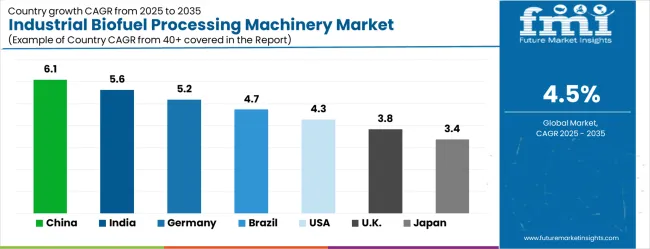
| Country | CAGR (2025-2035) |
|---|---|
| China | 6.1% |
| India | 5.6% |
| Germany | 5.2% |
| Brazil | 4.7% |
| USA | 4.3% |
| UK | 3.8% |
| Japan | 3.4% |
Regional synthesis reveals Asia-Pacific markets leading growth through biofuel manufacturing expansion and renewable energy production infrastructure development, while European countries maintain steady expansion supported by advanced manufacturing technology and research facility investments. North American markets show moderate growth driven by biofuel innovation and advanced processing applications.
China establishes market leadership through aggressive biofuel manufacturing development programs and comprehensive renewable energy production infrastructure expansion, integrating advanced biofuel processing machinery systems as standard components in facility automation and precision substrate handling applications. The country's 6.1% CAGR through 2035 reflects government initiatives promoting domestic biofuel capability and renewable energy manufacturing competitiveness that mandate automated processing systems in manufacturing facilities and research installations. Growth concentrates in major biofuel clusters where technology development showcases integrated processing machinery systems that appeal to domestic manufacturers seeking automated precision handling capabilities and advanced packaging applications.
Chinese manufacturers are developing cost-effective biofuel processing machinery solutions that combine domestic production advantages with advanced automation features, including precision positioning systems and integrated process control capabilities. Distribution channels through state energy programs and manufacturing equipment suppliers expand market access, while government funding for renewable energy technology development supports adoption across diverse manufacturing and research segments.
Strategic Market Indicators:
In Bangalore, Mumbai, and Chennai, biofuel facilities and renewable energy manufacturers are implementing advanced processing machinery systems as standard equipment for precision handling operations and substrate processing applications, driven by increasing energy production and government programs that emphasize manufacturing competitiveness and technology advancement capabilities. The market is projected to demonstrate a 5.6% CAGR through 2035, supported by government renewable energy manufacturing initiatives and biofuel development programs that promote automated processing equipment for domestic facilities and international partnership projects. Indian energy companies are adopting biofuel processing machinery systems that provide efficient substrate processing capabilities and automated handling features, particularly appealing in technology centers where precision manufacturing represents critical operational requirements for export competitiveness.
Market expansion benefits from growing renewable energy manufacturing capabilities and international technology partnerships that enable domestic production of advanced processing systems for biofuel and energy applications. Technology adoption follows patterns established in manufacturing automation, where precision control and reliability drive procurement decisions and operational deployment strategies.
Market Intelligence Brief:
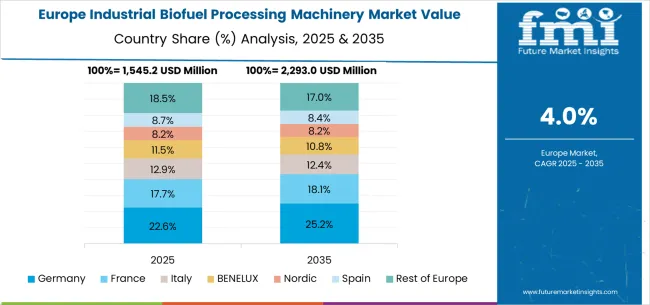
Germany's advanced manufacturing technology market demonstrates sophisticated biofuel processing machinery deployment with documented operational effectiveness in renewable energy research facilities and precision manufacturing applications through integration with existing automation systems and quality control infrastructure. The country leverages engineering expertise in precision machinery and automation systems integration to maintain a 5.2% CAGR through 2035. Technology centers showcase premium installations where biofuel processing machinery integrates with comprehensive manufacturing platforms and research equipment to optimize substrate handling effectiveness and process precision capabilities.
German equipment manufacturers prioritize system precision and industry compatibility in biofuel processing machinery development, creating demand for premium systems with advanced features, including environmental control and integration with research facility infrastructure. The market benefits from established manufacturing technology leadership and willingness to invest in advanced automation technologies that provide long-term operational benefits and support research excellence requirements.
Market Intelligence Brief:
Brazil's market expansion benefits from diverse renewable energy manufacturing demand, including biofuel assembly and technology development equipment upgrades, and government energy programs that increasingly incorporate automated processing solutions for manufacturing competitiveness applications. The country maintains a 4.7% CAGR through 2035, driven by rising energy production and increasing awareness of biofuel processing machinery technology benefits, including automated processing and quality improvement capabilities for domestic manufacturing operations.
Market dynamics focus on cost-effective biofuel processing machinery solutions that balance advanced handling features with affordability considerations important to Brazilian renewable energy manufacturers. Growing technology sector development creates sustained demand for precision processing systems in manufacturing infrastructure and research facility modernization projects.
Strategic Market Considerations:
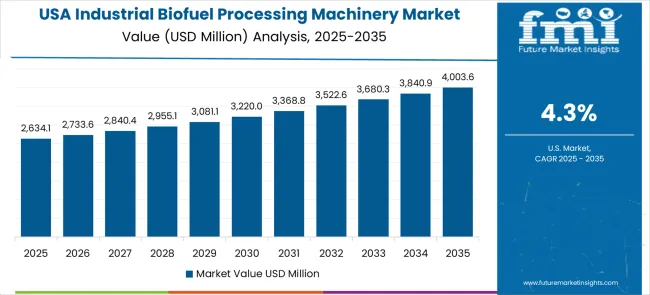
The United States market emphasizes advanced biofuel processing machinery features, including precision automation systems and integration with comprehensive renewable energy manufacturing platforms that manage substrate handling, process control, and quality assurance applications through unified automation systems. The country is projected to show a 4.3% CAGR through 2035, driven by biofuel industry modernization under manufacturing equipment upgrades and research facility demand for reliable automated processing systems with advanced positioning capabilities. American renewable energy manufacturers prioritize operational effectiveness with biofuel processing machinery delivering consistent substrate positioning through advanced control algorithms and environmental adaptation capabilities for diverse processing requirements.
Technology deployment channels include major renewable energy equipment suppliers, specialized automation system providers, and research facility procurement programs that support professional installation for complex manufacturing applications. Biofuel industry integration capabilities with established manufacturing systems expand market appeal across diverse operational requirements seeking precision and reliability benefits in advanced fuel production environments.
Performance Metrics:
In Cambridge, Edinburgh, and other research centers, British renewable energy research facilities and biofuel manufacturers are implementing advanced processing machinery systems to enhance precision handling capabilities and support sustainable fuel development that aligns with advanced energy research requirements and specialized processing protocols. The U.K. market demonstrates sustained growth with a 3.8% CAGR through 2035, driven by research facility modernization programs and technology development initiatives that emphasize advanced processing equipment for biofuel research and specialty energy manufacturing applications. British research institutions prioritize biofuel processing machinery systems that provide precise substrate positioning capabilities while maintaining compatibility with existing research equipment and enabling diverse material handling requirements.
Market expansion benefits from government research funding programs that mandate advanced processing capabilities in research equipment specifications, creating sustained demand across the U.K.'s research and development sectors where operational precision and material compatibility represent critical requirements. The regulatory framework supports biofuel processing machinery adoption through research facility standards and international collaboration requirements that promote advanced processing systems aligned with global research capabilities.
Strategic Market Indicators:
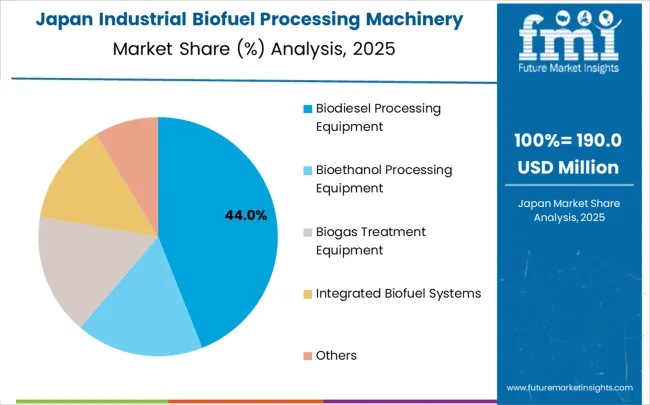
Japan demonstrates steady market development with a 3.4% CAGR through 2035, distinguished by renewable energy manufacturers' preference for high-precision biofuel processing machinery that integrates seamlessly with existing manufacturing systems and provides reliable long-term operation in specialized processing applications. The market prioritizes advanced features, including precision positioning, environmental control, and integration with comprehensive manufacturing platforms that reflect Japanese manufacturing expectations for technological sophistication and operational excellence in renewable energy production environments.
Key market characteristics:
The industrial biofuel processing machinery market operates with moderate concentration, featuring approximately 12-15 meaningful participants, where leading companies control roughly 45-50% of the global market share through established renewable energy equipment industry relationships and comprehensive technology portfolios. Competition emphasizes processing capabilities, automation sophistication, and manufacturing platform integration rather than price-based rivalry in the premium segment.
Market Leaders encompass GEA Group, ANDRITZ, and Alfa Laval, which maintain competitive advantages through extensive renewable energy manufacturing expertise, global equipment supplier networks, and comprehensive system integration capabilities that create customer switching costs and support premium positioning. These companies leverage decades of precision automation experience and ongoing research investments to develop advanced biofuel processing machinery systems with high-efficiency processing and environmental compatibility features.
Technology Innovators include Sulzer, Valmet, and Bühler Group, which compete through specialized automation technology focus and innovative precision interfaces that appeal to renewable energy customers seeking advanced efficiency capabilities and manufacturing flexibility. These companies differentiate through rapid technology development cycles and specialized biofuel application expertise focused on next-generation processing requirements.
Regional Specialists feature companies like Crown Iron Works, Novozymes, and Axens, which focus on specific geographic markets and specialized applications, including advanced substrate handling and research facility solutions. Market dynamics favor participants that combine reliable hardware with advanced automation software, including process monitoring and predictive maintenance capabilities.
| Item | Value |
|---|---|
| Quantitative Units | USD 6,510.9 million |
| Equipment Type | Biodiesel Processing Equipment, Bioethanol Processing Equipment, Biogas Treatment Equipment, Integrated Biofuel Systems, Others |
| Application | Agricultural Waste to Energy, Municipal Organic Waste Treatment, Industrial Organic Waste Utilization, Renewable Energy Power Plants, Others |
| Regions Covered | Asia Pacific, North America, Europe, Latin America, Middle East & Africa |
| Countries Covered | China, India, Germany, Brazil, the U.S., the U.K., Japan, and 25+ additional countries |
| Key Companies Profiled | GEA Group, ANDRITZ, Alfa Laval, Sulzer, Valmet, Bühler Group |
The global industrial biofuel processing machinery market is estimated to be valued at USD 6,510.9 million in 2025.
The market size for the industrial biofuel processing machinery market is projected to reach USD 10,111.2 million by 2035.
The industrial biofuel processing machinery market is expected to grow at a 4.5% CAGR between 2025 and 2035.
The key product types in industrial biofuel processing machinery market are biodiesel processing equipment, bioethanol processing equipment, biogas treatment equipment, integrated biofuel systems and others.
In terms of application, agricultural waste to energy segment to command 38.0% share in the industrial biofuel processing machinery market in 2025.
Explore Similar Insights

Thank you!
You will receive an email from our Business Development Manager. Please be sure to check your SPAM/JUNK folder too.
Chat With
MaRIA